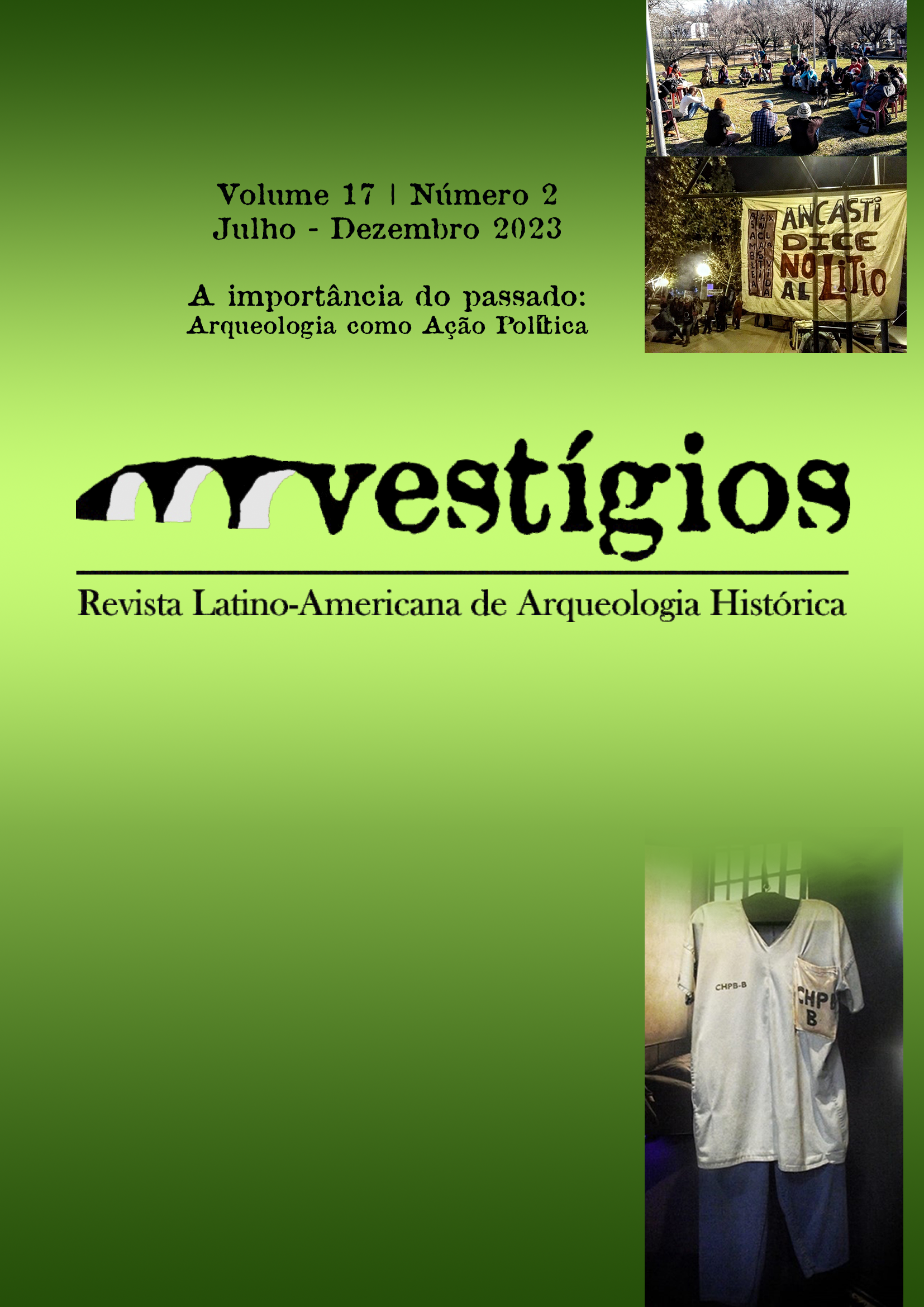Animist relations and relational ontologies in archaeological sites
DOI:
https://doi.org/10.31239/vtg.v17i2.41599Keywords:
hybridism, relational animism, archaeological sitesAbstract
The text presents the result of a dialogue between the authors that focuses on topics such as Hybridism, Relational Animism, and Archaeological Sites. The authors, in both essayistic and committed ways, experiment with a programmatic and iconic proposal, formulated in the context of postmodern and postcolonial thoughts, of “taking seriously” multidimensional ontologies of production of knowledge. The assumptions of modern Cartesian science, with its organizations of referenced, objectivist, and limited nature, resist the animistic understandings or relational ontologies found in pre-modern or non-Western societies. Experiencing and taking the proposal seriously and diluting the limits between object and subject or between people and animals, the authors show a world where hybrid actors live together in a scenario organized by the tendency of all agents to accumulate. The authors present hybrid phenomena of political and patrimonial scope, in the example of archaeological sites as discarded heaps, which lack definitions and a displacement of agency relations.
Downloads
References
Appadurai, A. (1986). Introduction: Commodities and the Politics of Value. In Appadurai, A. (Org.). The Social Life of Things: Commodities in Cultural Perspective (p. 3–63). Cambridge: Cambridge UP.
Brasil. (2010) Lei nº 12.305/2010. Disponível em: http://www.planalto.gov.br/ccivil_03/_ato2007-2010/2010/lei/l12305.htm. Acesso em: 22 out. 2022).
Brasil (2012) Lei Federal nº 12.651/2012. Disponível em: http://www.planalto.gov.br/ccivil_03/_ato2011-2014/2012/lei/l12651.htm. Acesso em 22out. 2022.
Caillois, R. (2018). Steine. München: Carl Hanser Verlag.
Campos, L. C. S. (2018). Sítio Arqueológico. In Grieco, B. & Teixeira, L. & Thompson, A. (Org.). Dicionário IPHAN de Patrimônio Cultural. Rio de Janeiro, Brasília: IPHAN/DAF/Copedoc, (verbete).
Canetti, E. (1995). Massa e Poder. São Paulo: Companhia das Letras.
Cohen W. A. & Johanson, R. (Org.). (2005). Filth: Dirt, disgust, and modern life. Minnesota: University of Minnesota Press.
Darwin, C. (1872). The Expression of the Emotions in Man and Animals. London: John Murray.
Droit, R-P. (2003). Dernières nouvelles des choses. Une expérience philosophique. Paris: Odile Jacob.
Gell, A. (1998). Art and Agency: An Anthropological Theory. Oxford: Clarendon Press.
Gibson, J. J. (1979). The Ecological Approach to Visual Perception. Boston: Houghton Mifflin Harcourt.
Haraway, D. J. (2003). The Companion Species Manifesto: Dogs, People, and Significant Otherness. Chicago: Prickly Paradigm Press.
Hilbert, K. (2020). Ossos do ofício: Arqueologia na prática. Curitiba: Appris.
Hornborg, A. (2006). Animism, fetishism, and objectivism as strategies for knowing (or not knowing) the world. Ethnos, 71(1). 21–32.
Husserl, E. (1985). Die phänomenologische Methode. Stuttgart: Klaus Held.
Ingold, T. (2000). The perception of the environment: Essays on livelihood, dwelling and skill. London: Routledge.
Lakoff, G. & Johnson, M. (1980). Metaphors we live by. Chicago: University of Chicago Press.
Latour, B. (1991). Nous n'avons jamais été modernes. Essai d'anthropologie symétrique. Paris: La Découverte.
Latour, B. (2009). Perspectivism: ‘type’ or ‘bomb’. Anthropology Today, 25(2). 1–2.
Levi-Strauss, C. (1989). O Pensamento Selvagem. Cananéia: Papirus.
Lorenz, K. (1993). Os fundamentos da etologia. São Paulo: UNESP.
Mayhew, H. (2009). London Labor and the London Poor: A cyclopedia of the condition and earnings of those that will work, those that cannot work, and those that will not work. New York: Cosimo Classics.
Olsen, B. (2010). In Defense of Things: Archaeology and the Ontology of Objects. Walnut Creek: AltaMira Press.
Pompeu, F. & Hilbert, K. (2020). Nossas outras arqueologias até as últimas consequências. Vestígios, 14(1). 115–139.
Pompeu, F. (2022). O badalo. Manuscrito.
Rathje, W. & Murphy, C. (2001). Rubbish! The Archaeology of Garbage. Tucson: The University of Arizona Press.
Soentgen, J. (1996). Das Unscheinbare: Phänomenologische Beschreibungen von Stoffen, Dingen und fraktalen Gebilden. Berlin: Akademie.
Soentgen, J. (2018). Ökologie der Angst. Berlin: Matthes & Seitz.
Terreno da Havan no RS tinha 20 peças arqueológicas de até 2 mil anos. Disponível em: https://ultimosegundo.ig.com.br/brasil/2021-12-18/terreno-havan-pecas-arqueologicas.html . Acesso em: 22 out. 2022.
Thompson, M. (1979). Rubbish Theory. The creation and destruction of value. Oxford.
Tocchetto, F. B. (2010). Fica dentro ou jogo fora? Abre práticas cotidianas na Porto Alegre oitocentista. São Leopoldo: Oikos.
Uexküll, J. von. (1940). The Theory of Meaning. Semiotica, 42. 25–82.
Viveiros de Castro, E. (2004). The Transformation of Objects into Subjects in Amerindian Ontologies. Common Knowledge, 10(3). 463–484.
Viveiros de Castro, E. (2014). Multinaturalismo e Perspectivismo na América indígena. In Viveiros de Castro, E. A Inconstância da Alma Selvagem e outros ensaios de Antropologia (p. 225-252). São Paulo: Cosac & Naify.
Waldman, M. (2021). The Silenced Garbage: The incomplete congruency between physical and imaginary worlds. Academia Letters, Article 3292, 2021.
Weber, H. (2014). Abfall. In Samida, S. & Eggert, M. K. H. & Hahn, H.-P. (Org.). Handbuch Materielle Kultur. Bedeutungen, Konzepte, Disciplinen (p. 157-165). Stuttart. Weimar: Verlag J. B. Metzler.
Wilk, R. & Schiffer, M. B. (1979). The Archaeology of Vacant Lots in Tucson, Arizona. American Antiquity, 44(3). 530–536.
Downloads
Published
How to Cite
Issue
Section
License
Copyright (c) 2023 Klaus Peter Hilbert, Filipi Gomes de Pompeu

This work is licensed under a Creative Commons Attribution-NonCommercial 4.0 International License.

O trabalho Vestígios - Revista Latino-Americana de Arqueologia Histórica de https://periodicos.ufmg.br/index.php/vestigios/index está licenciado com uma Licença Creative Commons - Atribuição-NãoComercial 4.0 Internacional.
Baseado no trabalho disponível em https://periodicos.ufmg.br/index.php/vestigios/index.
Podem estar disponíveis autorizações adicionais às concedidas no âmbito desta licença em https://periodicos.ufmg.br/index.php/vestigios/index.


